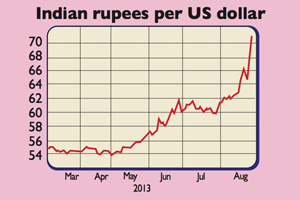Get the latest financial news, insights and expert analysis from our award-winning MoneyWeek team, to help you understand what really matters when it comes to your finances.
You are now subscribed
Your newsletter sign-up was successful
Want to add more newsletters?

Twice daily
MoneyWeek
Get the latest financial news, insights and expert analysis from our award-winning MoneyWeek team, to help you understand what really matters when it comes to your finances.

Four times a week
Look After My Bills
Sign up to our free money-saving newsletter, filled with the latest news and expert advice to help you find the best tips and deals for managing your bills. Start saving today!
India continued to bear the brunt of the emerging-market sell-off this week. On Tuesday, the rupee slid by around 3% against the dollar, its worst one-day drop in 18 years. On Wednesday, it fell even further, reaching a new record low of almost 70 to the dollar. The currency has lost around 15% against the greenback this month and a quarter since early May. The benchmark Sensex stock market index has slid by almost 7% this month.
What the commentators said
The latter was in focus this week. The government passed a Food Security Bill. It will sell subsidised wheat and rice to the 1.2 billion-strong population. This revived fears that the government "will be tempted to launch a flurry of fresh populist spending ahead of elections" due by May 2014, noted Swati Bhat of Reuters. The plan is to keep the fiscal deficit to 4.8% of GDP this year, but doubts are growing. According to Kotak Institutional Equities, the subsidies could cost a third more than foreseen.

This crisis will pass, said Sharma. But don't expect a "meaningful turnaround" in India's fortunes until a new government is in place.
MoneyWeek
Subscribe to MoneyWeek today and get your first six magazine issues absolutely FREE

Sign up to Money Morning
Don't miss the latest investment and personal finances news, market analysis, plus money-saving tips with our free twice-daily newsletter
Don't miss the latest investment and personal finances news, market analysis, plus money-saving tips with our free twice-daily newsletter
Stay up to date with MoneyWeek:Follow us onTwitter,FacebookandGoogle+
Get the latest financial news, insights and expert analysis from our award-winning MoneyWeek team, to help you understand what really matters when it comes to your finances.
MoneyWeek is written by a team of experienced and award-winning journalists, plus expert columnists. As well as daily digital news and features, MoneyWeek also publishes a weekly magazine, covering investing and personal finance. From share tips, pensions, gold to practical investment tips - we provide a round-up to help you make money and keep it.
-
 Should you buy an active ETF?
Should you buy an active ETF?ETFs are often mischaracterised as passive products, but they can be a convenient way to add active management to your portfolio
-
 Power up your pension before 5 April – easy ways to save before the tax year end
Power up your pension before 5 April – easy ways to save before the tax year endWith the end of the tax year looming, pension savers currently have a window to review and maximise what’s going into their retirement funds – we look at how

